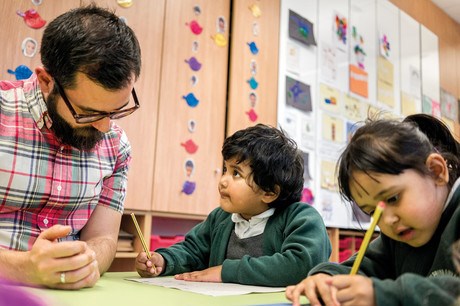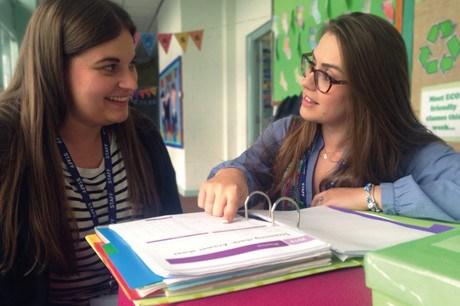Training Today: Early Years Degrees - Skilling up
Charlotte Goddard
Monday, July 11, 2016
Thousands of people do early childhood degrees each year – and unlike EYT status, they usually have to fund it themselves through a loan. Why do they do it? Charlotte Goddard reports

When Suffolk College (now University Campus Suffolk) launched a full-time early childhood studies degree in 1993, it was the first of its kind. Although early years policy and practice have undergone significant changes since that first degree was launched, and new statuses such as the Early Years Teacher (EYT) have emerged as part of a continuing drive to professionalise the early years workforce, early childhood studies degrees are popular: approximately 20,000 students at around 50 institutions are engaged in a range of early childhood studies degrees in the UK.
Carolyn Silberfeld, chair of Early Childhood Studies Degrees Network, which came up with the estimate, says, ‘Early childhood degrees continue to increase in popularity – they appeal to such a broad spectrum of applicants.’
While EYT courses are practice-based and vocational, early childhood studies is primarily an academic course, albeit with a vocational strand which can include placements. Early childhood studies degrees were developed to encourage students to look at the experiences and needs of the whole child, rather than just one aspect such as health or education, and to promote an inter-disciplinary approach.
It’s fair to say that neither gaining EYTS nor an early childhood studies degree guarantees a pay increase or even career progression. What both offer is a chance to upskill. According to Dr Eunice Lumsden, head of early years at the University of Northampton, what the degree offers, she says, is ‘the opportunity to gain an in-depth knowledge of children that you don’t get if you are doing a professional course. I think everyone should do an early childhood studies degree before working with children.’
Ms Silberfeld believes that while the content of these courses has adapted somewhat with the times, the philosophy behind them remains true to the original aims.
She says, ‘Some titles may have changed to reflect whatever is happening in the early years landscape, for example calling a course early years education rather than studies, but they still look at children from a holistic perspective. When it comes to content, modules have developed to incorporate policy changes, digital technologies, and new curriculums.’ While some courses do offer practice experience, as the number of students increases it has become trickier to find placements for them.
The programmes aim to draw on a range of subject areas, such as history, psychology, education, health, welfare, sociology and social policy, cultural studies, the law, and political and economic perspectives, linking together theory and practice. Some degree courses offer students the chance to complete EYTS alongside the undergraduate degree, while in other cases students go on to complete teacher training after they have graduated. They also tend to attract a wide range of people: ‘You get people deciding to have a career change, as well as those already working with children who want to improve their chances of promotion, and students coming straight from sixth form,’ says Ms Silberfeld.
‘We are aimed at people interested in children and childhood,’ says Richard Harty, head of early childhood and education subject areas at the University of East London, the largest provider of early childhood courses in the capital. ‘A large proportion of students already work with children, so it’s about the next step, getting themselves in the position to move up the career ladder. The value of the degree is it opens doors for people.’
Mr Harty says the majority of applicants are initially looking at teaching in a school, but the breadth of the course often leads them in different (though usually early-years-related) directions such as research, play therapy or policy development.
While the content of EYT courses is based on early years teachers standards, early childhood studies degree courses are based on standards developed by the independent Quality Assurance Agency, which checks quality standards in higher education. They include a list of skills which graduates are expected to have mastered, such as the ability to constructively critique theories, practice and research in the area of child development, and demonstrate knowledge and awareness of the skills needed for different pedagogical approaches. Validated early childhood studies degrees are on the government’s approved list of qualifications that enable practitioners to count in the staff:child ratios at Level 3, as long as there is an element of assessed performance in an early years setting, which not all courses include.
Entrance requirements for early childhood studies degrees generally ask for English and maths GCSEs at grade C or above as a minimum, and sometimes science, as well as a certain number of UCAS points. The Government’s controversial workforce requirements at Level 3 though mean that without these GCSEs, a candidate will only count at level 2.
With all the talk of the degree’s popularity, some in the sector are concerned that the GCSE requirements are having a knock-on effect on the numbers coming through the system, because schools and colleges are now less likely to offer courses which have traditionally fed into the degrees, such as a GCSE in child development.
‘Schools can no longer put less able students on the child development programmes, because of the requirement for maths and English GCSEs, so many no longer offer them’ says Dr Lumsden.
The Open University is one of the few institutions that has no formal entry requirements for its BA (Hons) Early Childhood. ‘The Open University traditionally doesn’t look for academic entry requirements,’ says early years senior lecturer Dr Gill Goodliff. ‘However, we do flag up to applicants that if you have not got GCSEs, but are considering a career as an early years practitioner, you will need English and maths.’
The OU is launching its BA (Hons) Early Childhood this September, to replace its existing early years qualification. ‘The course started off as a foundation degree, but students were increasingly interested in coming in for the full degree,’ Dr Goodliff says. The new degree, which is consistent with the QAA benchmarks, aims to appeal to a wider market, including those with an interest in early years as well as practitioners.
Twenty-two-year-old Becky O’Reilly aims to become a teacher working with Reception-age children. No local institutions were offering degrees conferring EYTS, so Ms O’Reilly signed up for the Early Childhood Studies BA course at University Campus Suffolk.
‘The degree covers lots of different aspects of child development, and I was able to pick modules that were most relevant to me, like one focusing on phonics,’ she says. Ms O’Reilly opted to take ‘practitioner options’ as part of her degree course, which meant she had to gain a minimum of 150 hours placement experience, and allows her to work as a qualified Level 3 practitioner. Suffolk is one of a handful of institutions that still offers this option, which has generally been superseded by foundation degrees and EYTS.
The next step is early years teacher training, which Ms O’Reilly will begin in September with Suffolk and Norfolk Initial Teacher Training. ‘In the meantime I have applied for bank jobs in nurseries and was offered two positions,’ she says. ‘They all seemed keen on the degree and said it is a good one.’
For more experienced practitioners who already have qualifications, a postgraduate degree may be a tempting option. One example is the MA Early Childhood Education from Sheffield University, which aims to furnish the skills needed to carry out educational research and provide an exposure to leading child development experts.

ARE THEY WORTH THE MONEY?
As the cost of higher education rises, students are more than entitled to ask whether degrees are worth the £40,000 average debt they now represent. ‘Our own research into those taking early childhood studies found that whatever job they were doing prior to the degree, they were doing a slightly better paid job afterwards,’ says Carolyn Silberfeld, chair of Early Childhood Studies Degrees Network. ‘But the feeling was that they do not get what they consider to be graduate jobs in terms of money and status.’
‘Our students are employed, but not necessarily earning what you might view as graduate-level salaries,’ says Dr Gill Goodliff at Open University. ‘However, they feel fulfilled in their work and passionate about what they do.’
Where in the past employers might have supported practitioners through an early childhood studies degree, this is now unlikely. ‘Employers used to be very good around supporting employees with the cost or with time off,’ says Ms Silberfeld. But increasingly stretched budgets have meant ‘that has got much worse – students often have to do programmes like the OU on Saturdays or take annual leave to do a degree’.
Nevertheless, despite all this, early childhood studies remains a popular choice with many. ‘We have not seen the downturn in applications that might have been envisaged with rising costs,’ says Dr Goodliff.
Dr Eunice Lumsden at the University of Northampton adds, ‘Practitioners do these degrees because of their passion for the subject and desire to make a difference to children’s lives. Any work with children and families is about more than money – many people are reconciled to the low salaries when they apply. There’s a deep motivation to develop their skills.’
UPSKILLING AS AN EYT: ST BEDE ACADEMY, BOLTON

Early Years Teacher courses have become a political issue. The qualification was created by the Government to encourage more graduates into the sector. But despite having the word ‘teacher’ in the title, it does not confer Qualified Teacher Status, and so crucially the same pay and conditions as in schools. While in the first year of recruitment, 2013-4, the scheme recruited around 2,300 of its 2,400 target across the country, in its second year the number dropped by more than half to 879. Lack of interest from graduates means 18 EYT-accredited providers have decided not to offer EYT courses this September.
However, some providers are bucking this trend. The course is being offered this year by 44 universities and consortiums, a small number of which are new to the market. One such is St Bede Academy, which is offering two EYT routes for the first time this year. Leanne Earle, executive head of the teaching school, says the course was seen as a good way to upskill existing staff. ‘We thought if we have a need for it then there must be other schools who need it too.
‘While I think many of the critics of EYTS are right about the limited impact it may have upon new recruitment to early years education – and there certainly won’t be parity between EYTS and QTS as things stand – we are finding that those who have a real passion for early years and work there already, but without any formal early years training, can be upskilled, take an opportunity to develop professionally and do this without a cost to their employer.’
The Bolton-based primary, which now runs five private nurseries, will be offering EYT programmes as part of the Greater Manchester Bright Futures SCITT.
Ms Earle estimates that about 70 per cent of applicants come with an early years background, with others coming in with degrees in biomedical science, psychology and drama. Motivation to do the course comes down to three main factors. ‘A lot of interest comes from people already working in the early years. Some people have been working in the early years but don’t have a qualification, but have an unrelated degree. They feel they have missed out on the academic underpinning. Some people want EYTS to show they are qualified. And a lot of people are very passionate about early years and want to learn more,’ Ms Earle says.
People wouldn’t get on the course with a degree but no early years experience she adds, but only ‘a couple’ of enquiries have come from people with this background.
From this September, at least two St Bede staff will do the employment-based route. The teaching school is also offering the full-time graduate entry route, though has had fewer enquiries for this. They are aiming for 15 places across both routes.
What will it mean for those EYTs who it is training up in-house? Will they get a pay rise? Ms Earle says, ‘In PVI nurseries it can be hard to improve the pay structure, but what we are suggesting to people is having the formal qualification will increase the chance of promotion.’
And, unlike early childhood degrees, EYTS is Government-funded. ‘People are getting professional development without the [associated] cost.’
Under the graduate employment-based scheme, candidates can get £14,000 split equally between training course fees and an incentive (which can be used to meet employers’ costs such as cover for the trainee). Applicants must hold a full degree and English, Maths and a Science graded A-C, which must be either a GCSE or equivalent and the equivalent must meet the same level and breadth as a GCSE.
In a seemingly rather contradictory move, the Government has said that, unlike degree students, EYTs do not now need GCSEs to count in ratios, but do have to pass literacy and numeracy skills tests.
Training on the St Bede course is covered by senior leaders of education (SLEs) recruited from a range of settings and who have ‘a track record of leading improvement in Good or Outstanding schools’, Ms Earle says. The trainee would go with their SLE into his or her setting.
The teaching school has also won DfE funding for an early years improvement project, which involves matching expertise to the settings which need it – ‘a bit like a dating service’, Ms Earle adds. The funding goes on paying settings £200 per day for cover to release the ‘expert’ member of staff to do the training. The aim is to make sure there is no difference in quality of care or education between private nurseries and school nurseries, though she adds, ‘We are not saying school nurseries are better – we know there is outstanding practice in PVIs.’










